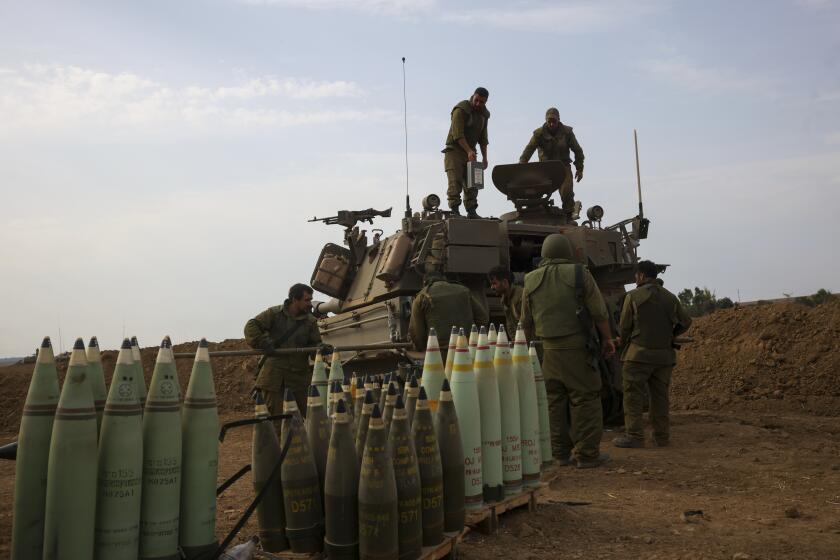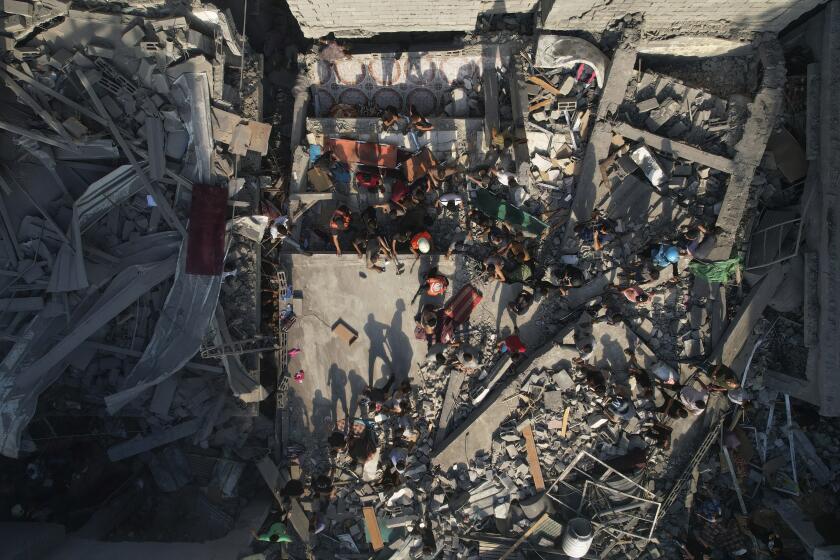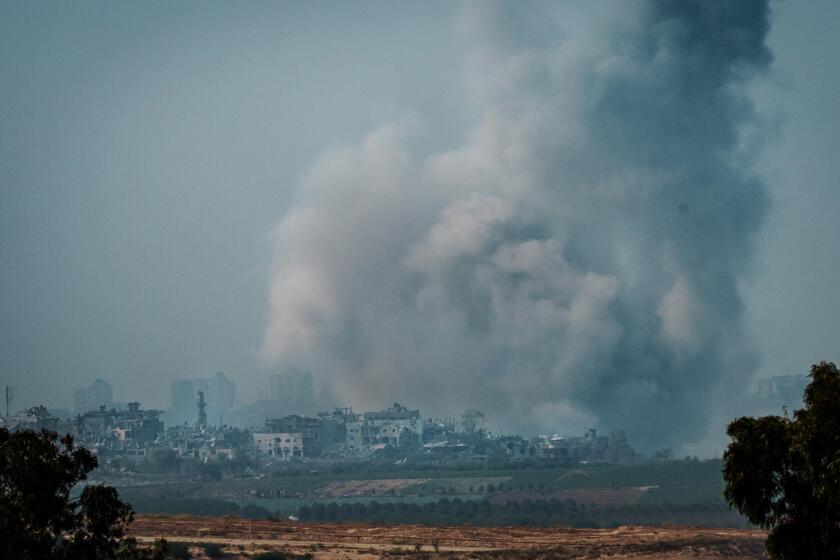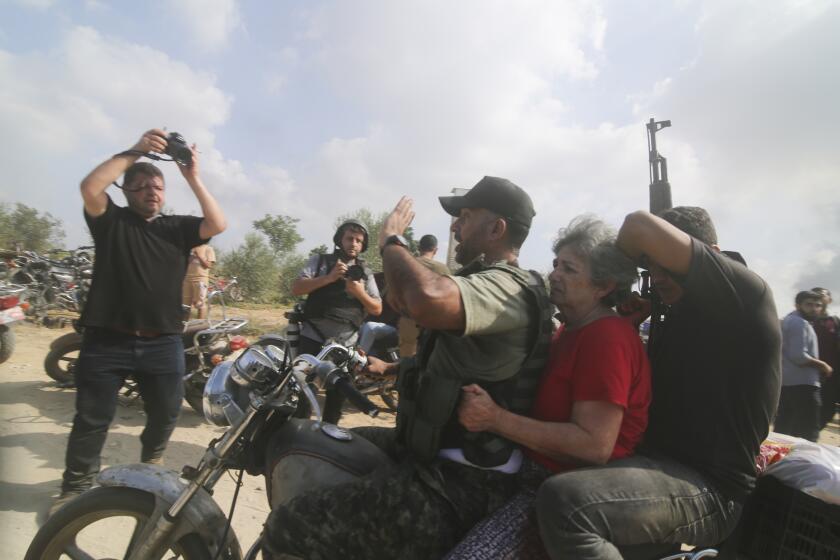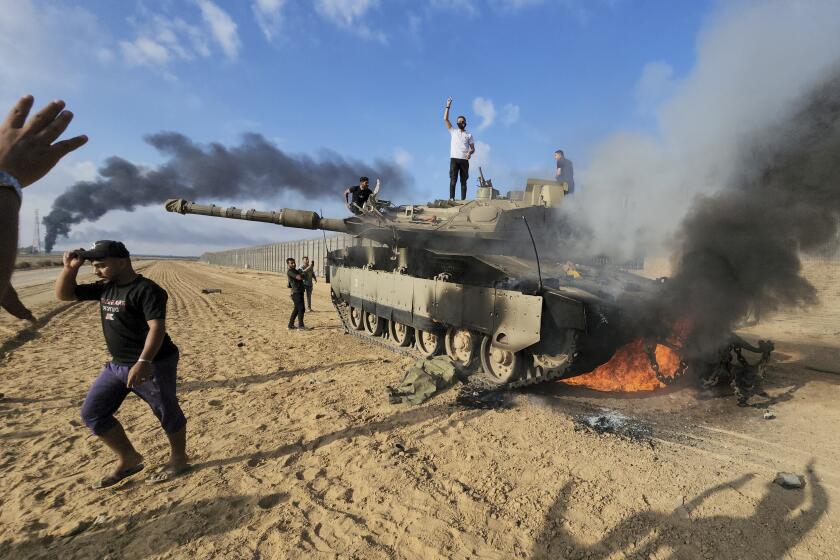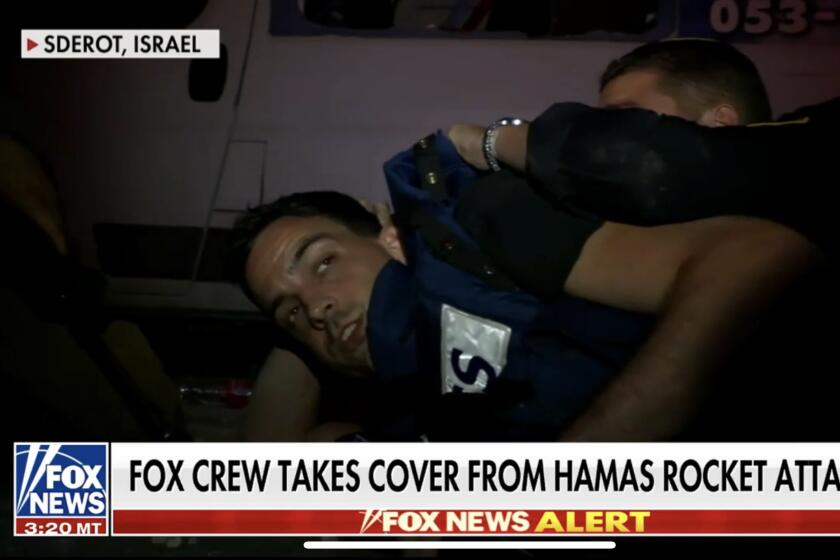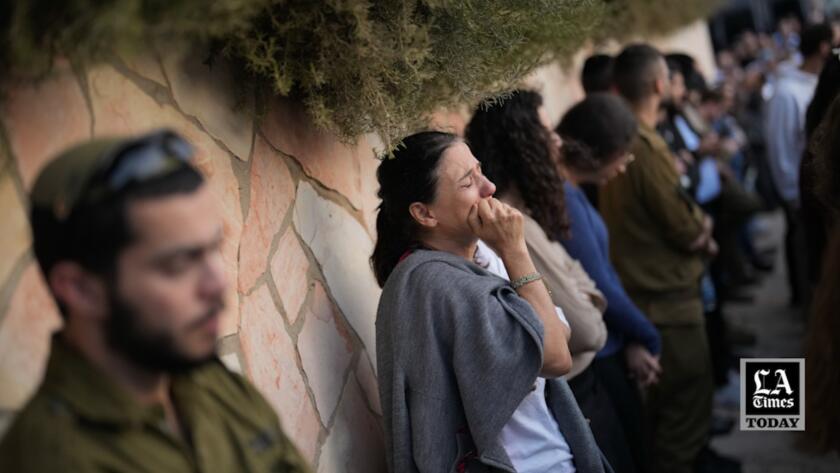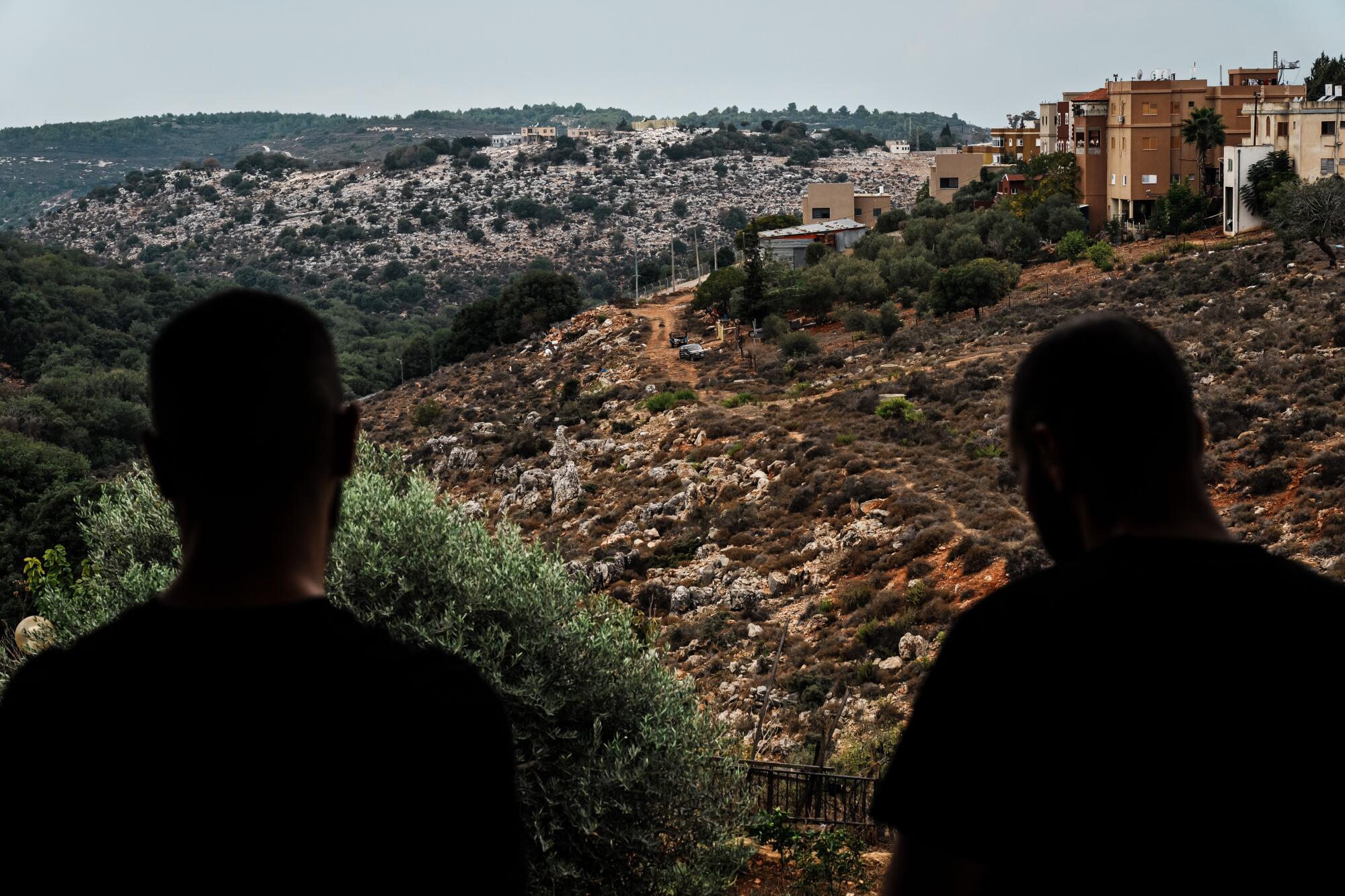
- Share via
ARAB AL-ARAMSHE, Israel — From his mountaintop perch above a valley straddling Israel and Lebanon, Mohammad Mgheis has watched no fewer than four wars unfold.
There was the 1967 Middle East War, when he was a small boy and his family scuttled from one place to another to avoid the bombs. In the 1973 Yom Kippur War, a pair of Israeli Phantom warplanes, their tails aflame, streaked above his head one night like shooting stars before crashing into the valley.
In 1983, during the first Lebanon war, he hid as Palestinian fighters in the valley faced off against Israeli troops arrayed on his side of the mountain. He managed to survive the second Lebanon war, in 2006, as well.
“Ever since I became conscious of the world, there’s been conflict here. Always,” said Mgheis, 62, his eyes lingering on the houses in the Lebanese village of Dhayra just across the border.
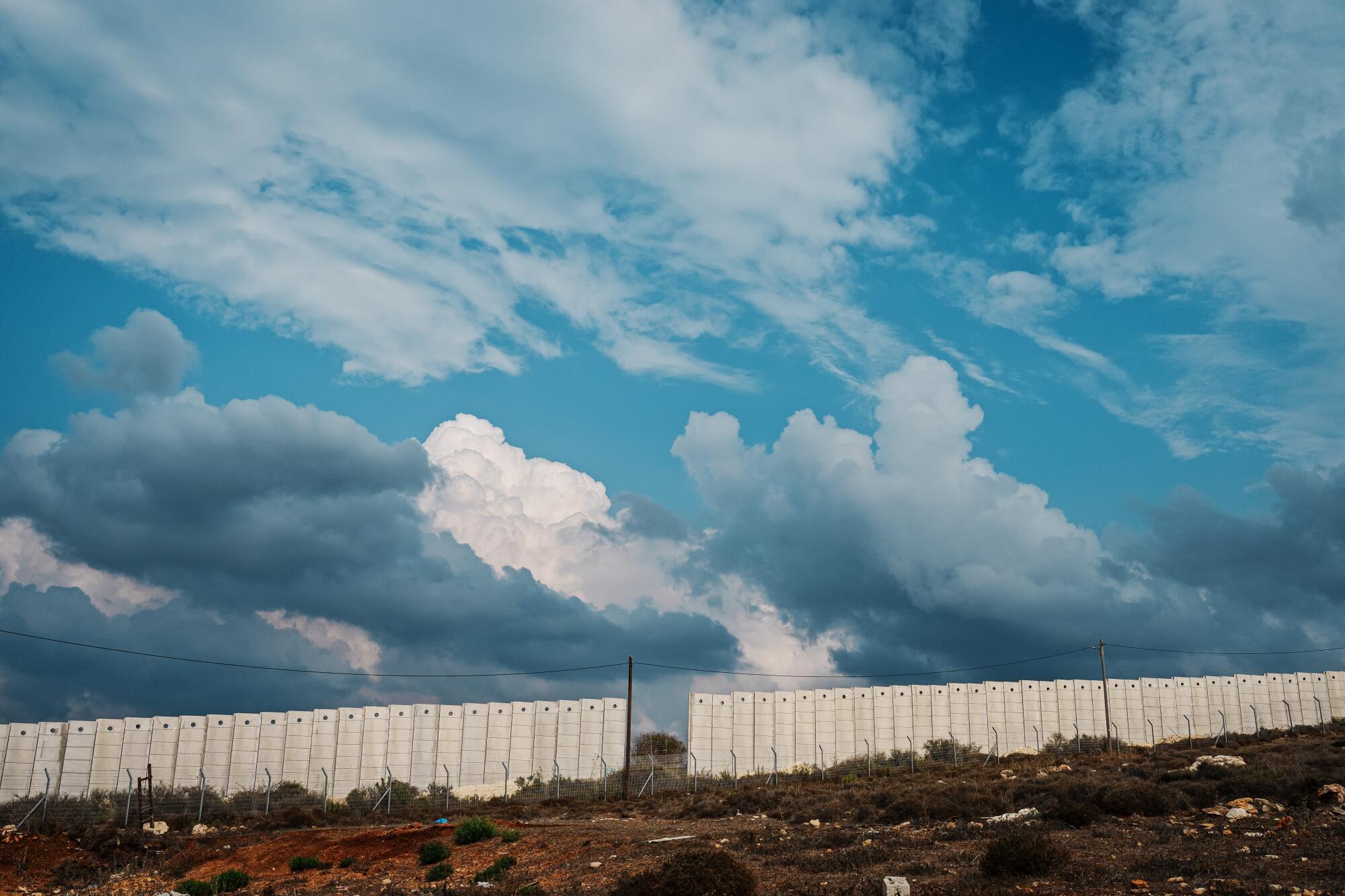
But none of those, he said, will compare with the war he believes is now brewing between Israel and its hostile neighbors. As Israel lashes back forcefully against the massive attack on its soil by Hamas militants, Mgheis and others fear that an expected ground invasion of Gaza will spiral into a titanic clash that pulls in Iran and its proxies, including Hezbollah in Lebanon and the Gaza-based Islamic Jihad.
Hamas has called on those groups to open new fronts against Israel if the nation’s tanks roll into the Gaza Strip.
“It won’t just be conflict here, but everywhere — all the Middle East,” Mgheis said. “Hezbollah, Iran, everyone will join.”
In a worrisome preview of what might come, border skirmishes have already erupted here in northern Israel, on the other end of the country from Hamas’ multipronged cross-border attack.
Israel battled Hamas infiltrators for a third day and massed tens of thousands of troops near the Gaza Strip after the biggest attack in decades on Israeli soil.
On Tuesday, a firefight broke out when gunmen slipped through the Lebanese border into Israel, killing three Israeli soldiers before they turned back.
A day later, Mgheis and other residents of Arab al-Aramshe, a tiny Israeli Bedouin village, watched as Hezbollah antitank missiles slammed into an Israeli position on a nearby hill — a response, the group said in a statement, to Israel targeting three of its fighters two days earlier.
Israeli forces replied with artillery shelling that hit 10 houses in Dhayra, leaving three people wounded, Lebanese authorities said. Sustained heavy machine gun fire echoed through the valley, said Khaled Sweidan, the 80-year-old patriarch of his family.
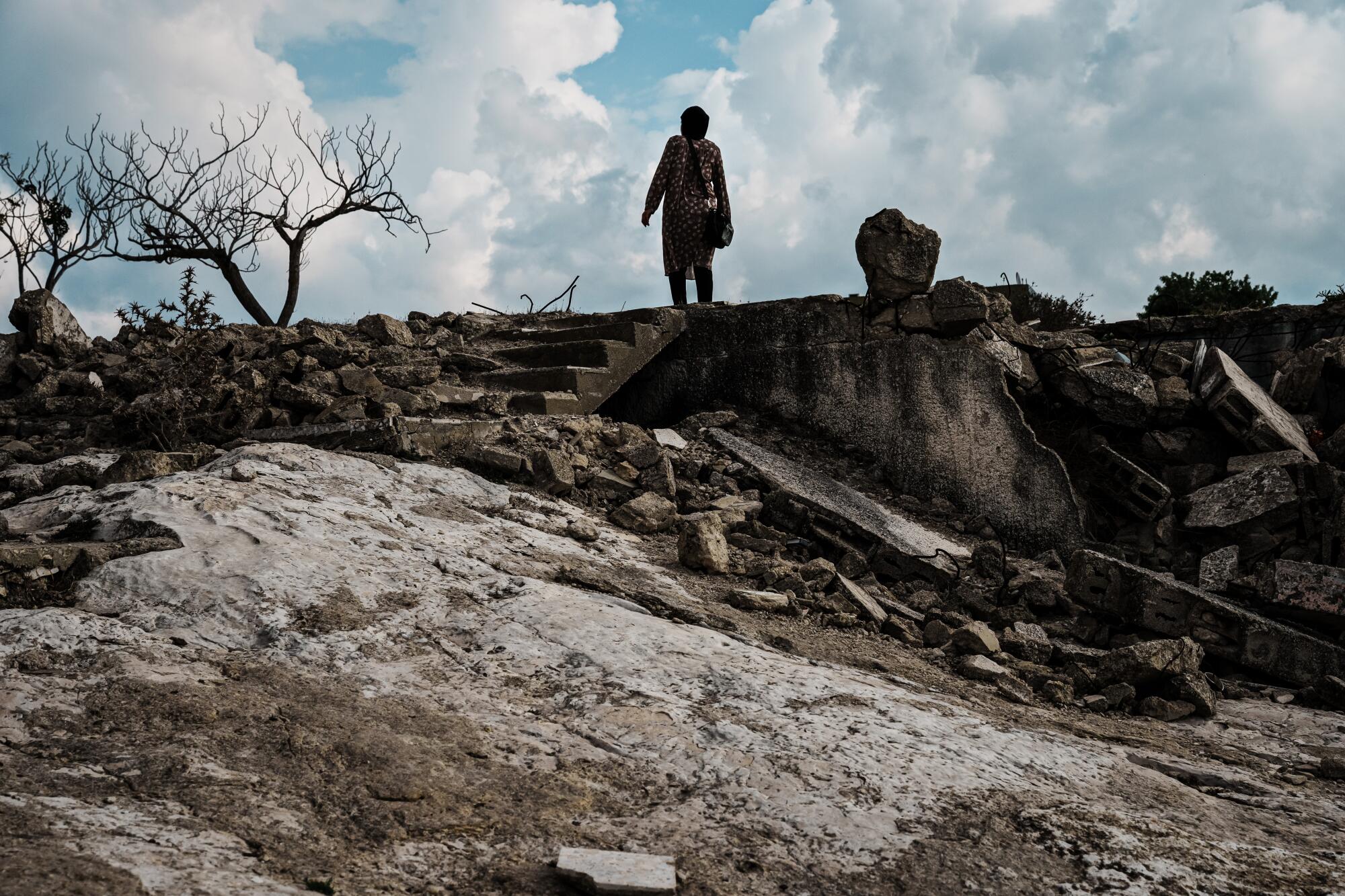
“We were sitting here and the army ordered us inside to go hide. We were terrified,” Sweidan said. “It’s all we hear these days — shooting and explosions.”
Sitting beside him with a frown on his face was his son, Samir, a member of Arab al-Aramshe’s local council.
Palestinians in the Gaza Strip stocking up at bakeries and grocery stores, fearing an Israeli ground incursion on top of the air campaign against Hamas.
“Look, there have always been incidents here, even if they were too insignificant for the press to write about them. We’re used to that,” he said. “But for the Israeli army to shoot artillery, for the other side to enter Arab al-Aramshe like this, that’s new.”
His wife, Elaine, came out with a plate of malfouf — cabbage rolls stuffed with rice and ground meat. She looked at one of their children, Adel, 13, and her nephew, Khaled, 16, who were sitting on the stoop.
“These kids don’t remember 2006. What do they know of war?” she said, setting the plate down on the table. Back then, a mother and her two daughters were killed when a bomb fell in their garden, she said.
It already feels worse now, though there have been no casualties in the village yet. “Just the number of attacks,” she said. “It’s been so many.”
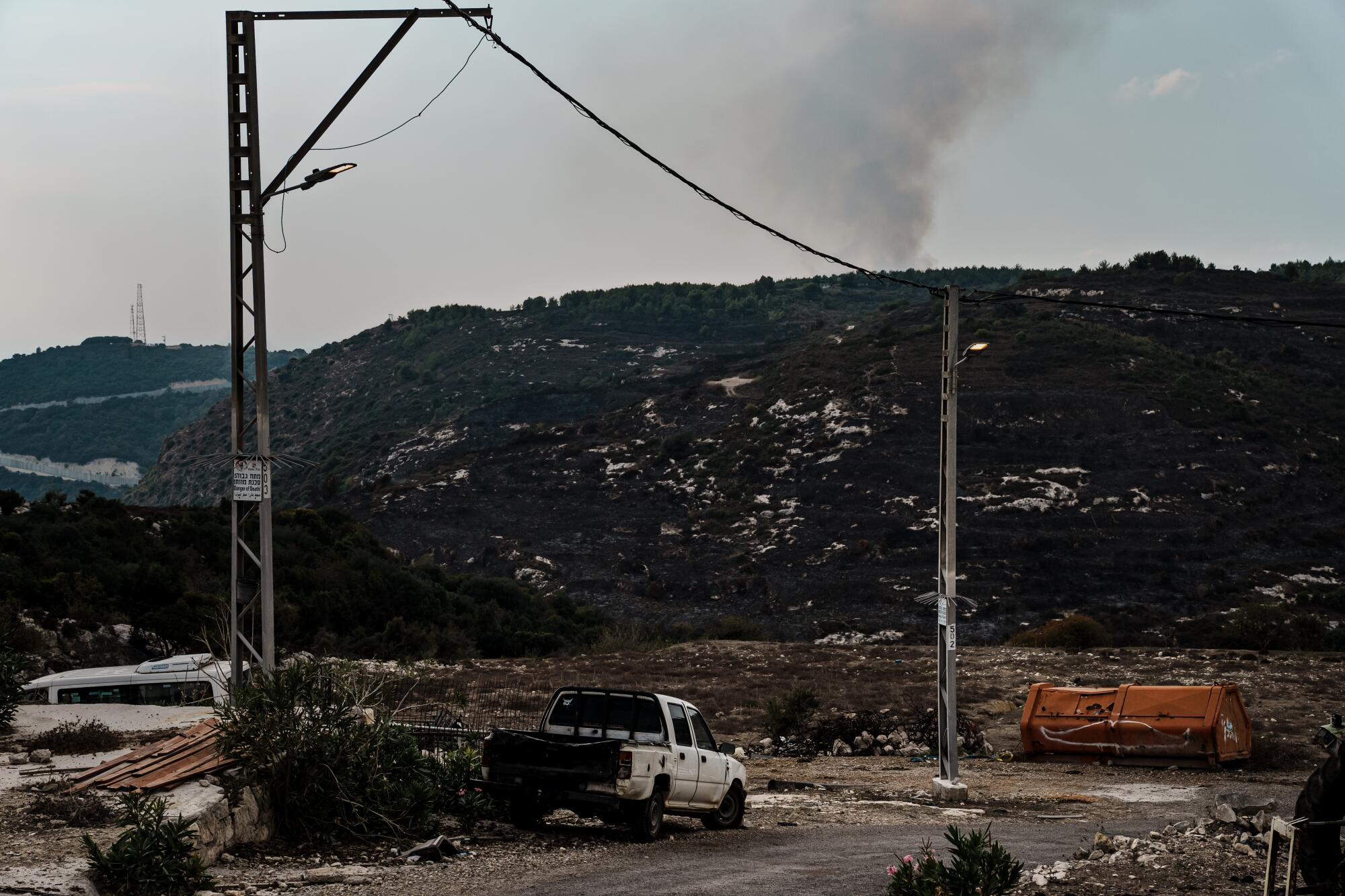
As she spoke, the gnat-like zizz of an Israeli drone circling overhead grew louder.
“They’re here every day now, 24 hours. You always hear them,” her husband said. “Before we would have one, maybe two. Now it’s six or seven. I lose count.”
It was another sign of how Israel’s north has gone on a war footing along with other parts of the country. You can spot columns of armor — tanks and armored personnel carriers — heading north on Route 6, the main trans-Israel highway, or awkwardly navigating cramped village streets and roundabouts. Most communities along the Israel-Lebanon border already have been evacuated.
The Israeli military said in a statement on Saturday night that it was preparing a coordinated offensive in Gaza using air, ground and naval forces.
Many of Arab al-Aramshe’s 1,750 residents have left, though voluntarily rather than under government orders. In their stead are jumpy Israeli soldiers clumped together on various street corners. Some train their rifles across the border at Dhayra, scanning for any movement. Both army and police units run patrols, stopping anyone not from the area; plainclothes intelligence agents follow outsiders to see where they go and with whom they speak.
Fearing that Hezbollah or other groups will try to capitalize on suspected cracks in Israel’s defense, President Biden dispatched an aircraft carrier group to the eastern Mediterranean and placed another at Israel’s disposal. To “anyone thinking of taking advantage of the situation,” Biden said Tuesday, “I have one word: Don’t. Don’t.”
In what was perhaps an attempt to emphasize that point, Israeli warplanes launched sorties Thursday against Syria — a staunch ally of Iran’s that has long been a conduit for arms to Hezbollah — bombing Damascus and Aleppo airports and knocking runways out of commission.
Despite the uptick in violence in northern Israel, Hamas’ call for solidarity and saber-rattling from other Iran-allied groups, Hezbollah’s attacks so far demonstrate a reluctance to escalate, said Mohanad Hage Ali, a Hezbollah expert and senior fellow at the Beirut-based Carnegie Middle East Center.
Hamas’ tactics are brutal and shocking, but its goal of ending Israel’s occupation is widely shared among Palestinians.
Part of that reluctance comes from the fact that Lebanon, a country in the midst of an economic implosion, can ill-afford more crises. Many Lebanese — including Hezbollah supporters — fear a repeat of 2006, when Israel destroyed not only wide swaths of the country’s south, where Hezbollah dominates, but also parts of the capital, Beirut.
Since that war, Hezbollah and Israel have maintained a respectful but wary modus vivendi, with the occasional tit-for-tat attack but little more.
But Hezbollah’s longtime insistence on the notion of “unity of battlegrounds” — where it would come to the aid of sister groups such as Hamas against Israel and the West — would force it to intervene, Hage Ali said.
“What’s the use of such an alliance if you won’t stand for them now, when Hamas is about to be obliterated?” he said, adding: “Hezbollah is still trying to message the Israelis that invading Gaza is a red line.”
California native Hersh Goldberg-Polin, 23, hasn’t been seen by family since before Hamas’ attack on Israel. They’re determined to find him and bring him home.
At the same time, Hamas’ unprecedented attack, which has killed 1,300 Israelis, may encourage Israeli leaders to move preemptively against Hezbollah.
Such a confrontation would be a far more difficult one than the war in 2006. Since then, Hezbollah cadres have gained combat experience in Syria, Iraq and Yemen. The group’s arsenal includes drones and potentially tens of thousands of precision missiles.
Urging restraint won’t work, given the scale of the Palestinian attacks. How far will further escalation go?
“If they bomb Hezbollah, it can strike Israel from the air, from the sea. They have capabilities they didn’t have before. It will be costly,” Hage Ali said.
In Metulla, a town about 25 miles northeast of Arab al-Aramshe, Stephane Juffa kept vigil from his well-appointed house on the highest hill. The town seemed empty, save for Israeli soldiers and a number of workers from Thailand who had arrived four years ago.
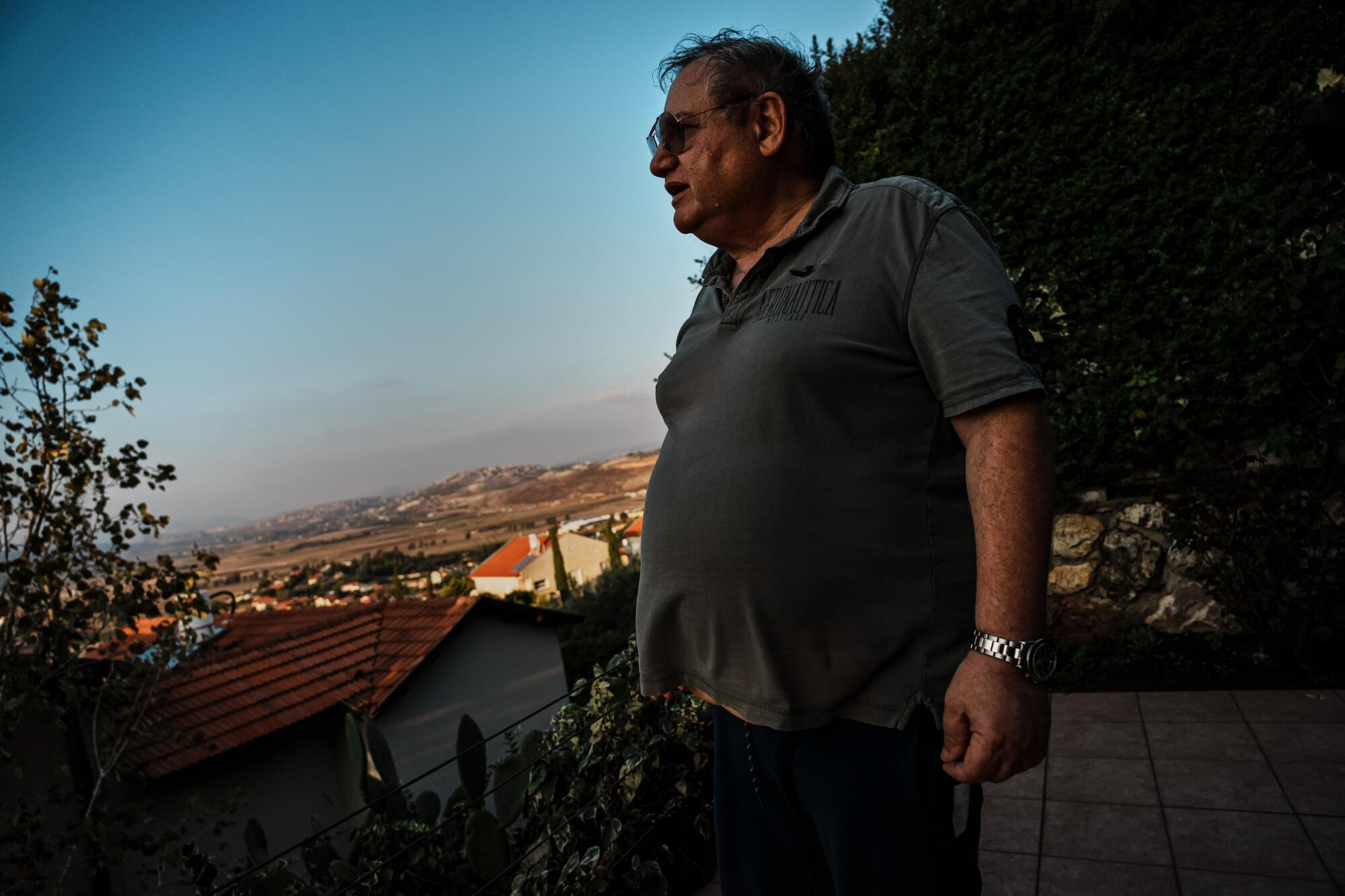
“Just across from us there’s the Lebanese town, Kfar Kila,” Juffa, a journalist with the Metulla News Agency, said late Thursday afternoon, while standing on his balcony, which boasts a commanding view of the Lebanese side of the border. “It’s all Hezbollah. Very bad place, lots of terrorists.”
He’s uncertain whether Hezbollah will join the fray, but if so, the group would regret it, he said.
The Israel-Hamas war is testing news media struggling with how to present the heinous casualties, combat misinformation on social media and face criticisms of bias.
“We’re very wounded by what happened last Saturday and we’re ready to fight,” Juffa said. “We don’t know how it will start, but we know how it will end.”
Barely 10 minutes after he spoke, three rockets launched from somewhere in southern Lebanon streaked through the darkening sky toward Metulla before Israel’s missile-defense system kicked into gear.
As for Juffa, loyalty to Israel is absolute for Mgheis and other residents of Arab al-Aramshe. Many of them served in the military and are revulsed by Hamas’ assault.
Gazing out at the Lebanese border, Mgheis sees the infrastructure of enmity — a border wall, an Israeli antenna tower, a Hezbollah observation post — that scars the bucolic landscape he knows so well and that divides families once able to travel unfettered between the two countries.
The prospect of a new war with Hezbollah, as part of a regional conflict in which Israel is beset on multiple fronts, inspires a fatalistic attitude in him.
Even when reports reached Arab al-Aramshe on Wednesday of Hezbollah fighters paragliding from Lebanon into Israel — just as some Hamas militants had done down south, from Gaza, on Saturday — Mgheis ignored orders for residents to retreat to shelters. Instead, he kept sitting outside.
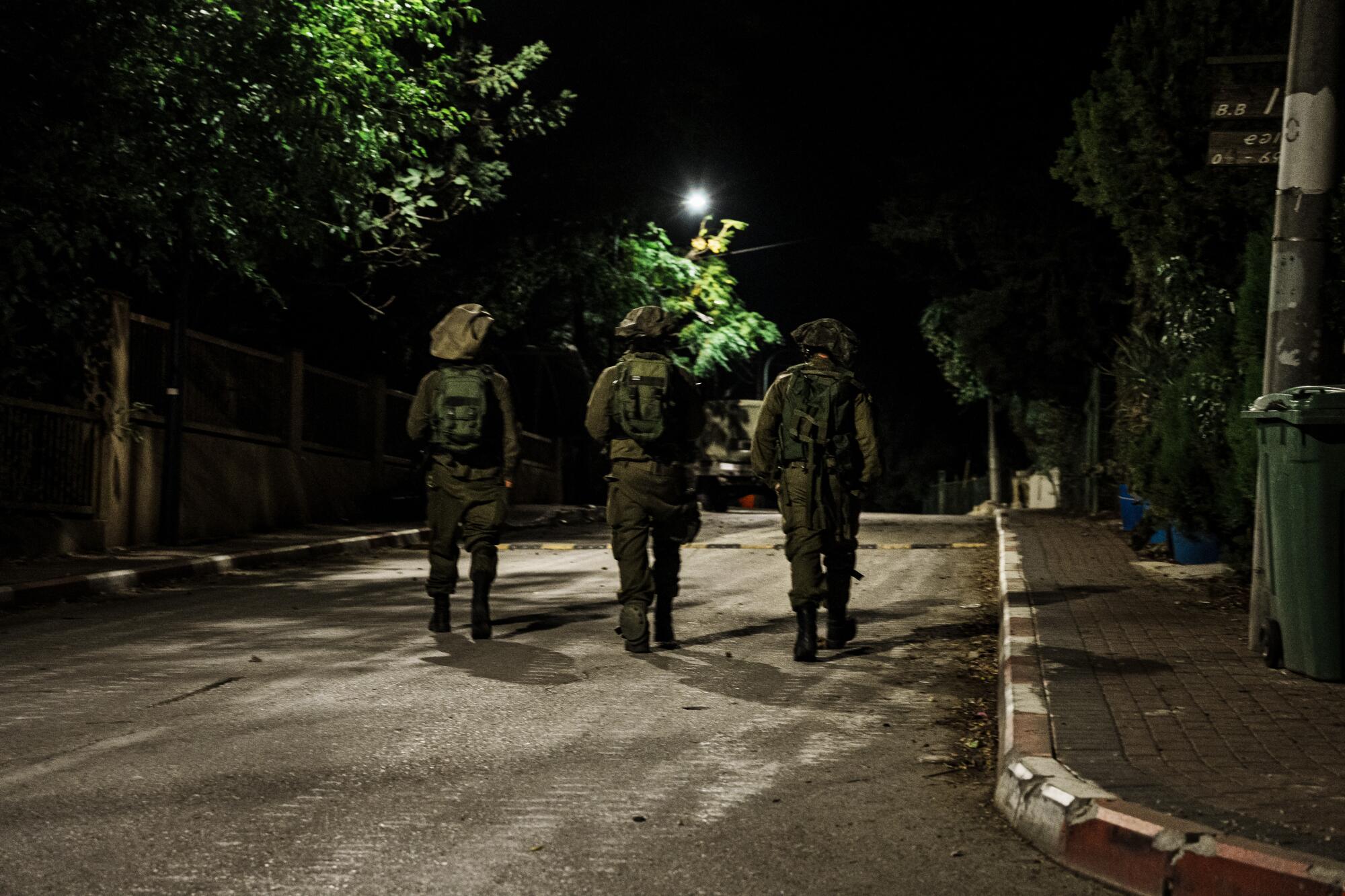
The reports turned out to be false.
“In 2006, the attacks were localized. You could escape to Tel Aviv or Jerusalem,” he said. “Now? Tel Aviv, rockets. Haifa, rockets. Jerusalem, rockets. Everywhere, rockets.
“So where would I go? I’ll stay home. We don’t want evil for anyone. We want it to be calm.”
- Share via
Watch L.A. Times Today at 7 p.m. on Spectrum News 1 on Channel 1 or live stream on the Spectrum News App. Palos Verdes Peninsula and Orange County viewers can watch on Cox Systems on channel 99.
More to Read
Sign up for Essential California
The most important California stories and recommendations in your inbox every morning.
You may occasionally receive promotional content from the Los Angeles Times.
